 Image 1 of 17
Image 1 of 17

 Image 2 of 17
Image 2 of 17

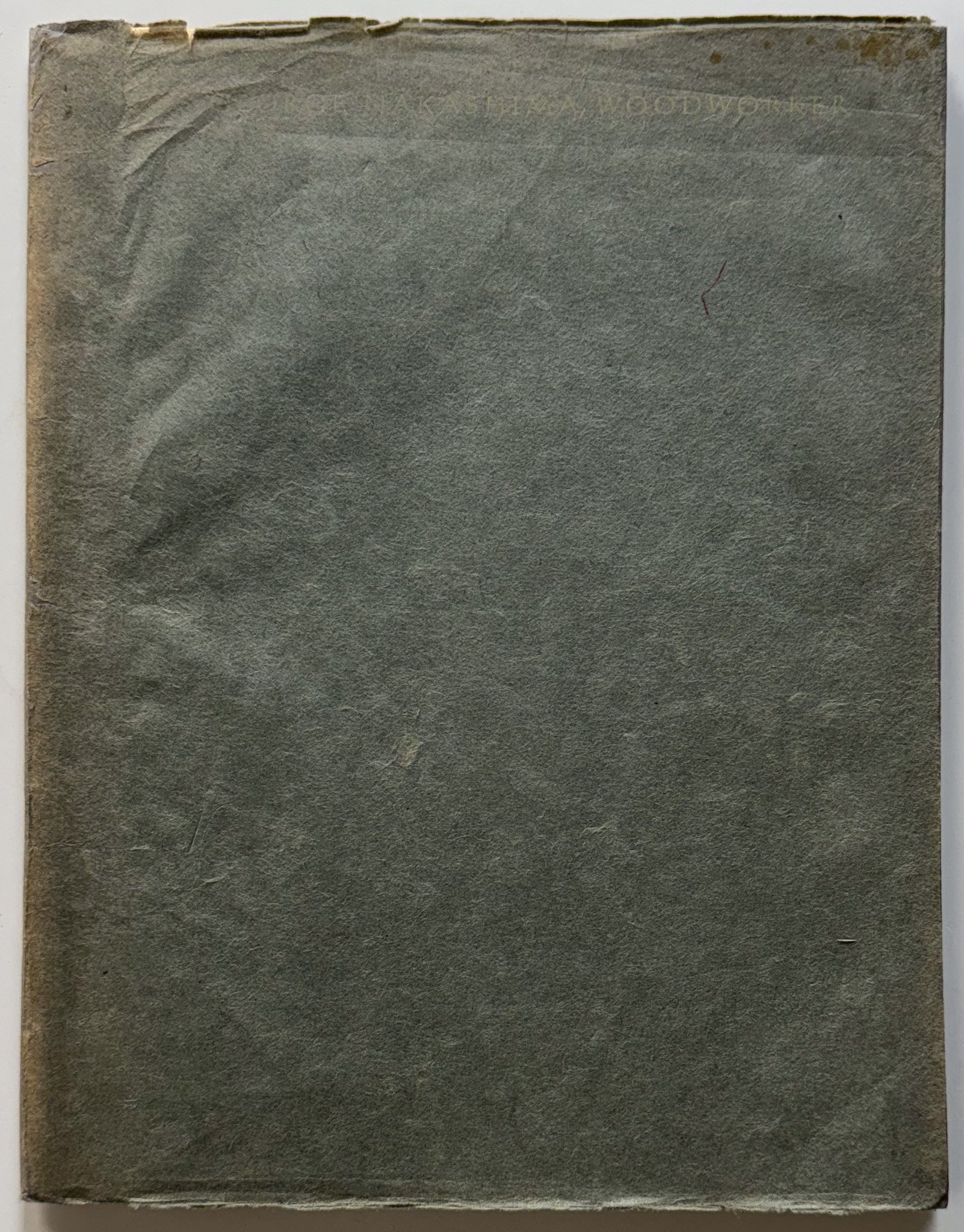 Image 3 of 17
Image 3 of 17

 Image 4 of 17
Image 4 of 17

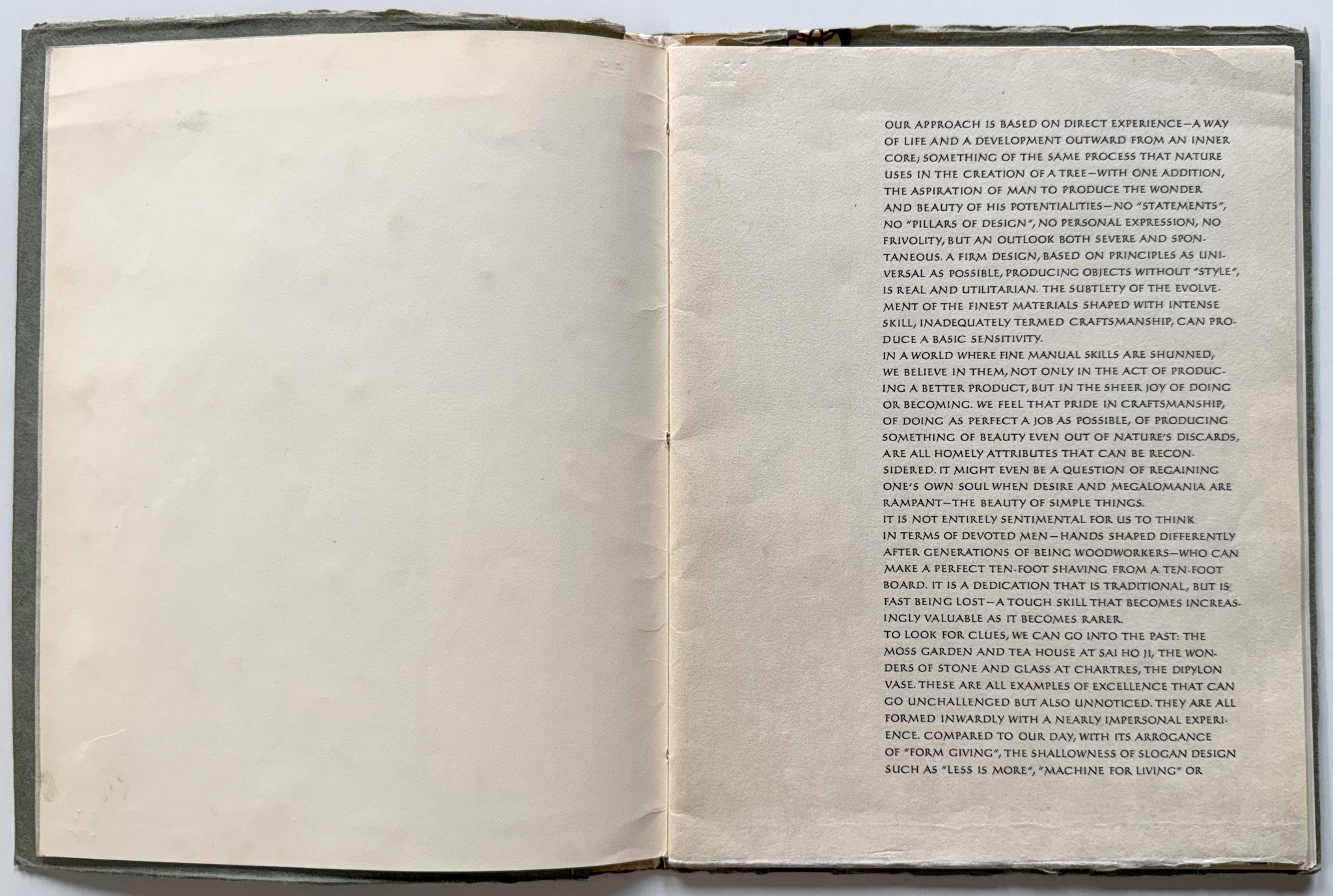 Image 5 of 17
Image 5 of 17

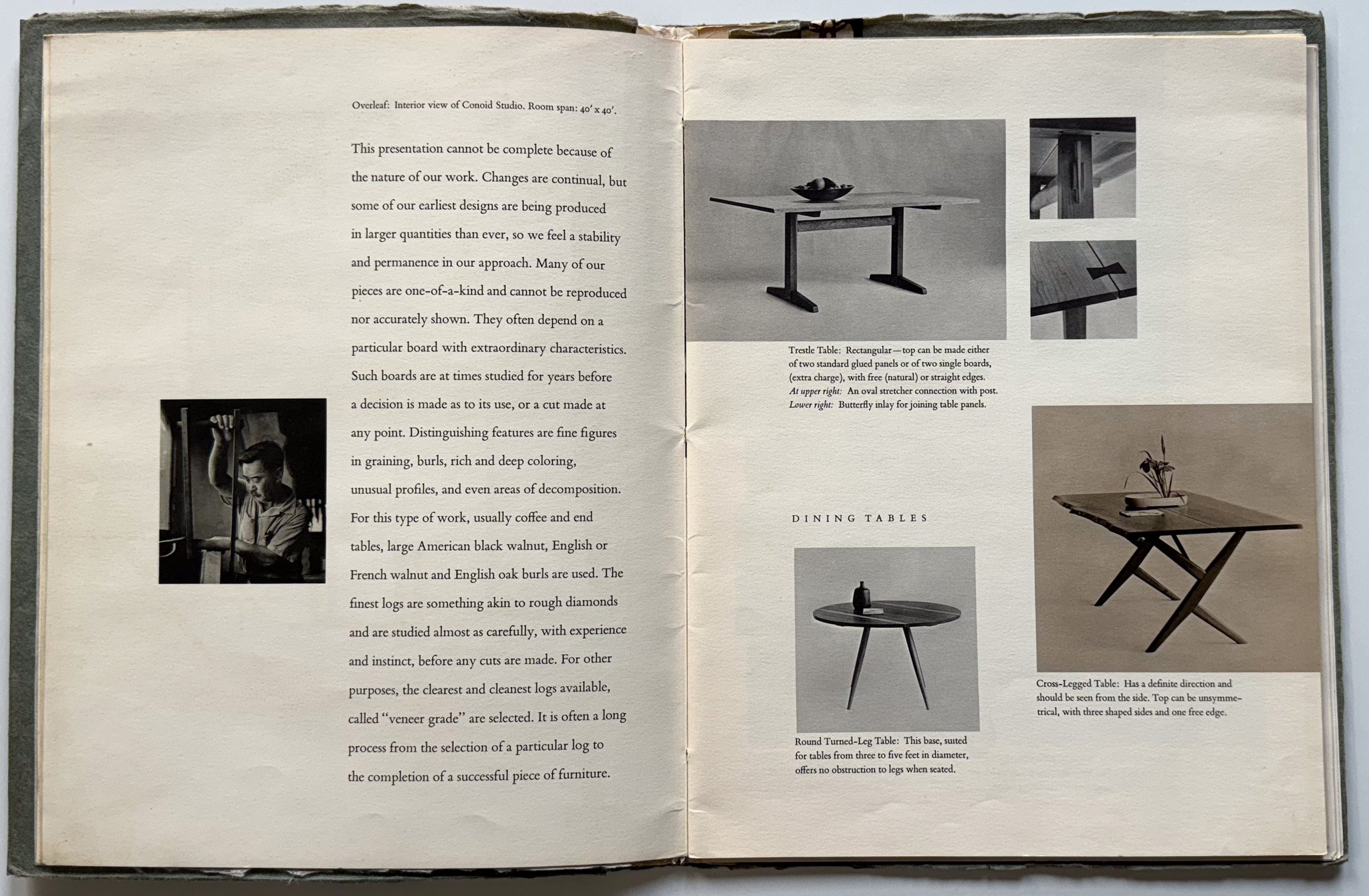 Image 6 of 17
Image 6 of 17

 Image 7 of 17
Image 7 of 17

 Image 8 of 17
Image 8 of 17

 Image 9 of 17
Image 9 of 17

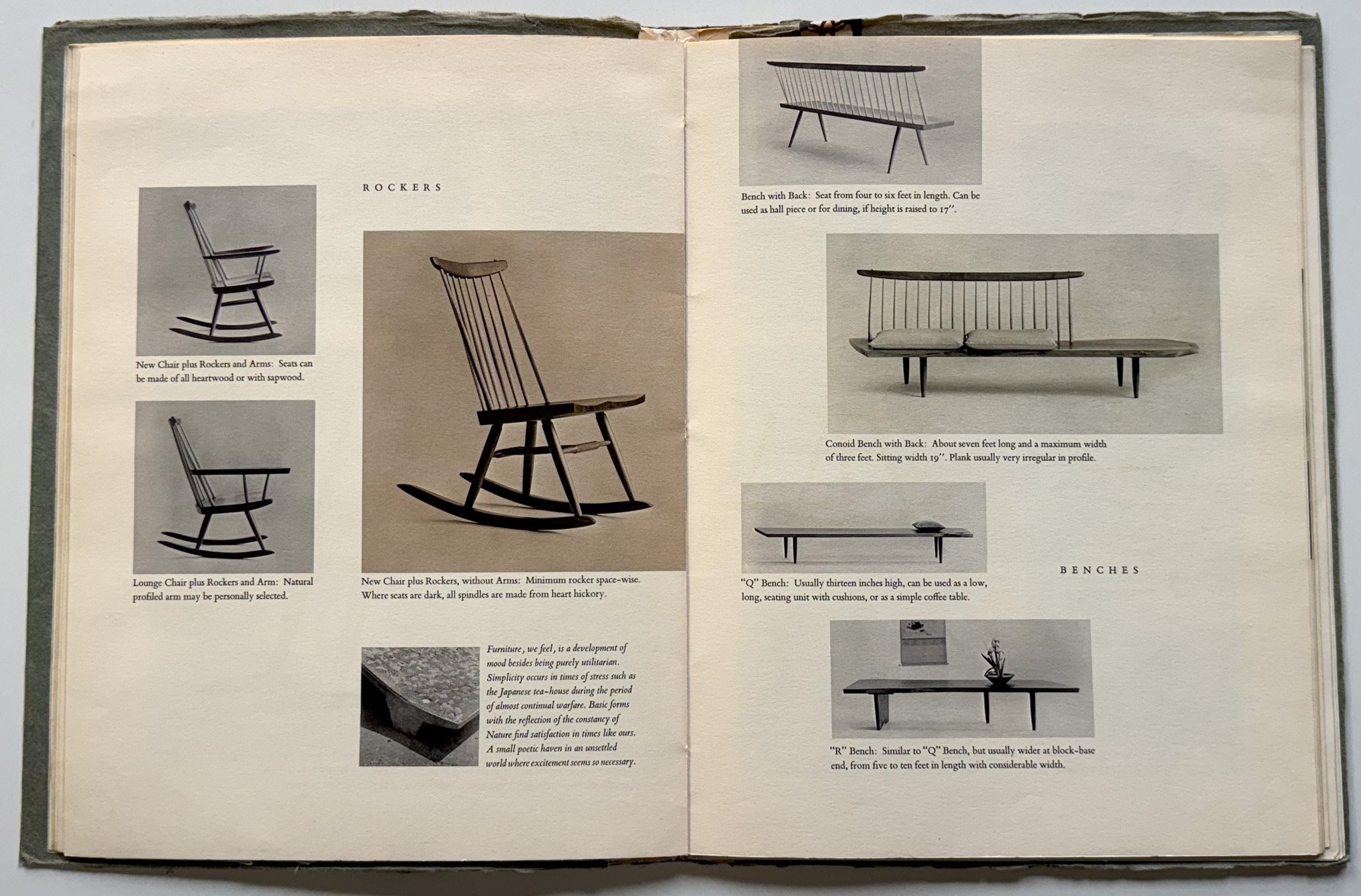 Image 10 of 17
Image 10 of 17

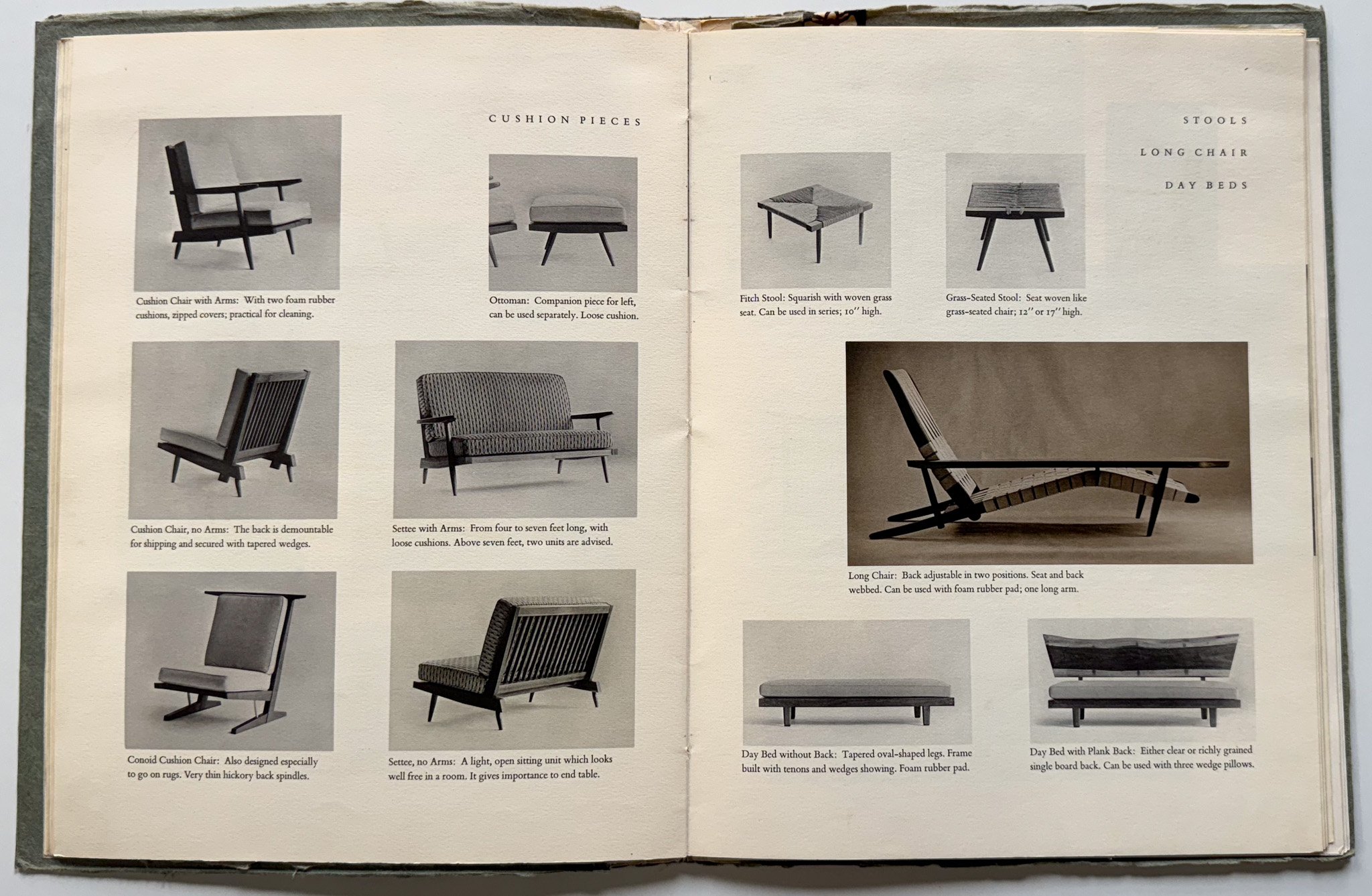 Image 11 of 17
Image 11 of 17

 Image 12 of 17
Image 12 of 17

 Image 13 of 17
Image 13 of 17

 Image 14 of 17
Image 14 of 17

 Image 15 of 17
Image 15 of 17

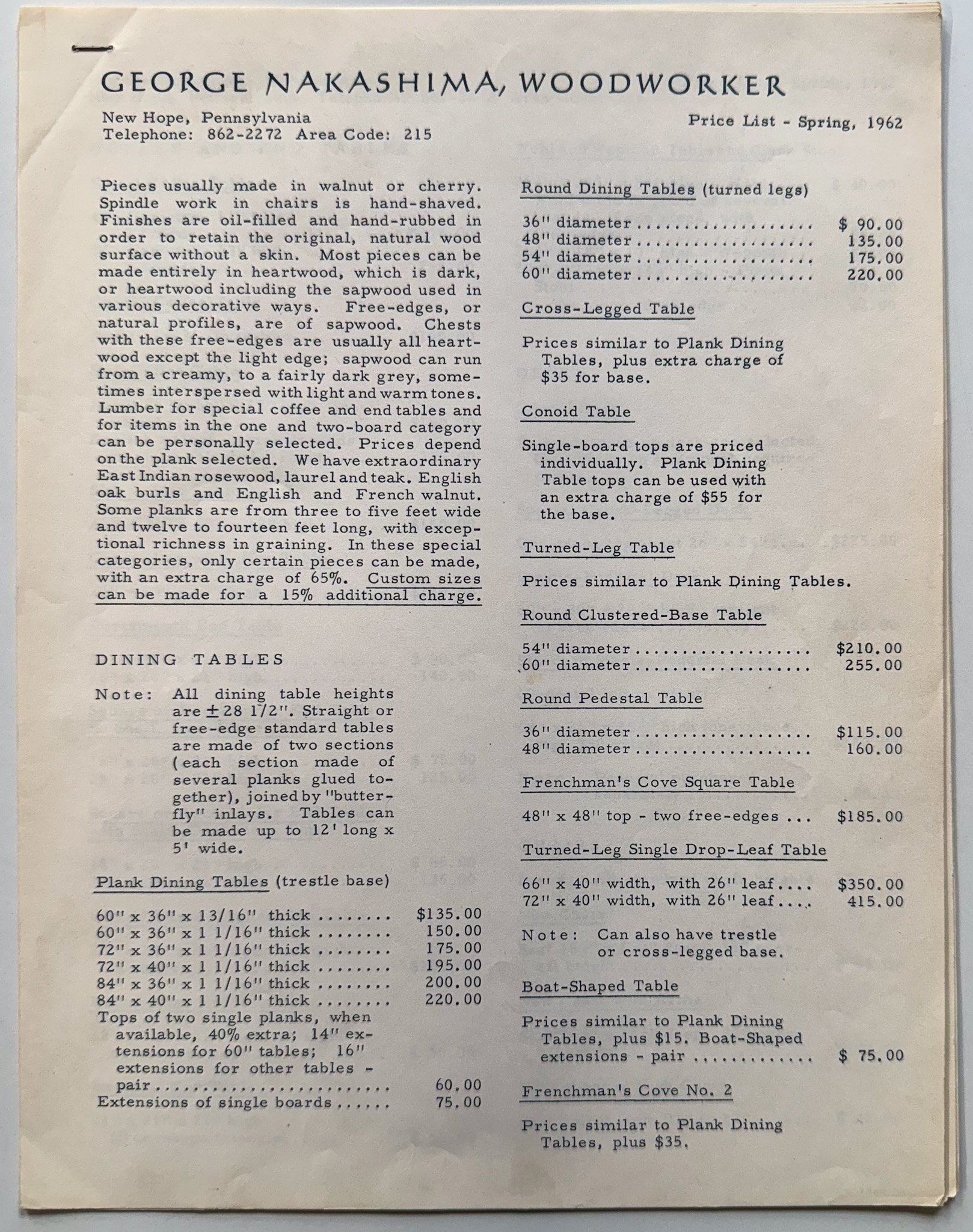 Image 16 of 17
Image 16 of 17

 Image 17 of 17
Image 17 of 17


















George Nakashima, Woodworker: New Hope, Pennsylvania (1962 Catalog, Signed)
The catalog comprises: First, an introductory paean to craftsmanship and the spirituality of woodworking culminating in Nakashima’s bold signature in ink, dated April 1962. Next, a full-page photo of the Conoid Studio followed by a succession of offerings with photos and descriptions including: Trestle Table, Cross-Legged Table, Round Turned-Leg table, Conoid Table, Turned-Leg Table, Round Clustered-Base Table, Round Pedestal Table, Frenchman’s Cove Square Table, Single Drop-Leaf Table, Boat-Shaped Table, Frenchman’s Cove No.2 Table (fold-out), Round Coffee Table, Conoid Coffee Table, Slab Coffee Table No. 2, Slab Coffee Table, Portsmouth End Table, Square or Rectangular End Table (with and without shelf), Cross-Legged Coffee Table, Conoid Studio End Tables, Conoid Desks, New Chairs, Mira Chairs, Lounge Chair, No Arm, Lounge Chair One-Arm, Grass-Seated Chair, Arm Chair, conoid Chair, New Chair plus Rockers and Arms, Lounge Chair plus Rockers and Arms, Conoid Benches, “Q” Bench, “R” Bench, Cushion Chair with and without Arms, Settee with and without Arms, Conoid Cushion Chair, Fitch Stool, Grass-Seated Stool, Long Chair, Day Bed without Back Day Bed with Plank Back, Drawer Front and Sliding Door Chests, Conoid Chest Triple Chest with Wood Sliding Doors, Hanging Wall Case, Seven Foot Hanging Wall Case, Hanging Wall Shelf with Drawers, Swett Bedside Table, Storage Headboard, Aland Headboard, Slatted Headboard, Desk and Table Lamps, Mira Mirror, and Floor Lamp. At the end is a three page discussion of the use of solid wood rather than veneer, stating the Nakashima ethos (“Furniture should be lived with and not considered something overly precious. A certain amount of scratching and denting adds character to the piece—in the trade called ‘distressing’, in our family, ‘Kevinizing,’ after the personal treatment by our young son”) with care instructions. 8vo (8.75” x 11.25”), 28 unnumbered pages with one fold-out page, Moriki paper wrappers, b/w and duotone illustrations throughuot. Per the colophon, “The green paper wrapper, 'Moriki,' and the end-leaves, 'Yamato,' were made by hand in Japan, as was 'Suzuki,' on which are printed Mr. Nakashima's introductory remarks. The introduction was set by hand in 8 point 'Codex' capitals, designed by Professor Georg Trump, for C.E. Weber Schriftgiesserei, of Stuttgart, Germany. It was printed by Harbor Press, Inc., New York City. The text matter was set in Monotype Bembo. The black and duotone illustrations were prepared for 300-line lithography and were reproduced by The Meriden Gravure Company on 80 pound Curtis Colophon Text. Each copy of this publication was hand-sewn by Gerhard Gerlach, Chappaqua, N.Y. Photography by G. William Holland. Designed by and produced under the direction of Quentin Fiore.” (Fiore was a graphic designer best-known for his collaborations with Marshall Mcluhan). This catalog documents Nakashima at the height of his abilities, and so represents a cynosure of American Craft Modernism in content, design and layout, and production quality. A scarce and important document, enhanced by the signature and date. With a six-page Spring 1962 price list laid in. Foxing limited to top right corner of front wrapper; toning to spine. Light bumping and chipping to edges, with creasing to rear wrapper. Minor damp staining and creasing to top left corner of front wrapper. Front and rear hinges professionally repaired.
The catalog comprises: First, an introductory paean to craftsmanship and the spirituality of woodworking culminating in Nakashima’s bold signature in ink, dated April 1962. Next, a full-page photo of the Conoid Studio followed by a succession of offerings with photos and descriptions including: Trestle Table, Cross-Legged Table, Round Turned-Leg table, Conoid Table, Turned-Leg Table, Round Clustered-Base Table, Round Pedestal Table, Frenchman’s Cove Square Table, Single Drop-Leaf Table, Boat-Shaped Table, Frenchman’s Cove No.2 Table (fold-out), Round Coffee Table, Conoid Coffee Table, Slab Coffee Table No. 2, Slab Coffee Table, Portsmouth End Table, Square or Rectangular End Table (with and without shelf), Cross-Legged Coffee Table, Conoid Studio End Tables, Conoid Desks, New Chairs, Mira Chairs, Lounge Chair, No Arm, Lounge Chair One-Arm, Grass-Seated Chair, Arm Chair, conoid Chair, New Chair plus Rockers and Arms, Lounge Chair plus Rockers and Arms, Conoid Benches, “Q” Bench, “R” Bench, Cushion Chair with and without Arms, Settee with and without Arms, Conoid Cushion Chair, Fitch Stool, Grass-Seated Stool, Long Chair, Day Bed without Back Day Bed with Plank Back, Drawer Front and Sliding Door Chests, Conoid Chest Triple Chest with Wood Sliding Doors, Hanging Wall Case, Seven Foot Hanging Wall Case, Hanging Wall Shelf with Drawers, Swett Bedside Table, Storage Headboard, Aland Headboard, Slatted Headboard, Desk and Table Lamps, Mira Mirror, and Floor Lamp. At the end is a three page discussion of the use of solid wood rather than veneer, stating the Nakashima ethos (“Furniture should be lived with and not considered something overly precious. A certain amount of scratching and denting adds character to the piece—in the trade called ‘distressing’, in our family, ‘Kevinizing,’ after the personal treatment by our young son”) with care instructions. 8vo (8.75” x 11.25”), 28 unnumbered pages with one fold-out page, Moriki paper wrappers, b/w and duotone illustrations throughuot. Per the colophon, “The green paper wrapper, 'Moriki,' and the end-leaves, 'Yamato,' were made by hand in Japan, as was 'Suzuki,' on which are printed Mr. Nakashima's introductory remarks. The introduction was set by hand in 8 point 'Codex' capitals, designed by Professor Georg Trump, for C.E. Weber Schriftgiesserei, of Stuttgart, Germany. It was printed by Harbor Press, Inc., New York City. The text matter was set in Monotype Bembo. The black and duotone illustrations were prepared for 300-line lithography and were reproduced by The Meriden Gravure Company on 80 pound Curtis Colophon Text. Each copy of this publication was hand-sewn by Gerhard Gerlach, Chappaqua, N.Y. Photography by G. William Holland. Designed by and produced under the direction of Quentin Fiore.” (Fiore was a graphic designer best-known for his collaborations with Marshall Mcluhan). This catalog documents Nakashima at the height of his abilities, and so represents a cynosure of American Craft Modernism in content, design and layout, and production quality. A scarce and important document, enhanced by the signature and date. With a six-page Spring 1962 price list laid in. Foxing limited to top right corner of front wrapper; toning to spine. Light bumping and chipping to edges, with creasing to rear wrapper. Minor damp staining and creasing to top left corner of front wrapper. Front and rear hinges professionally repaired.
The catalog comprises: First, an introductory paean to craftsmanship and the spirituality of woodworking culminating in Nakashima’s bold signature in ink, dated April 1962. Next, a full-page photo of the Conoid Studio followed by a succession of offerings with photos and descriptions including: Trestle Table, Cross-Legged Table, Round Turned-Leg table, Conoid Table, Turned-Leg Table, Round Clustered-Base Table, Round Pedestal Table, Frenchman’s Cove Square Table, Single Drop-Leaf Table, Boat-Shaped Table, Frenchman’s Cove No.2 Table (fold-out), Round Coffee Table, Conoid Coffee Table, Slab Coffee Table No. 2, Slab Coffee Table, Portsmouth End Table, Square or Rectangular End Table (with and without shelf), Cross-Legged Coffee Table, Conoid Studio End Tables, Conoid Desks, New Chairs, Mira Chairs, Lounge Chair, No Arm, Lounge Chair One-Arm, Grass-Seated Chair, Arm Chair, conoid Chair, New Chair plus Rockers and Arms, Lounge Chair plus Rockers and Arms, Conoid Benches, “Q” Bench, “R” Bench, Cushion Chair with and without Arms, Settee with and without Arms, Conoid Cushion Chair, Fitch Stool, Grass-Seated Stool, Long Chair, Day Bed without Back Day Bed with Plank Back, Drawer Front and Sliding Door Chests, Conoid Chest Triple Chest with Wood Sliding Doors, Hanging Wall Case, Seven Foot Hanging Wall Case, Hanging Wall Shelf with Drawers, Swett Bedside Table, Storage Headboard, Aland Headboard, Slatted Headboard, Desk and Table Lamps, Mira Mirror, and Floor Lamp. At the end is a three page discussion of the use of solid wood rather than veneer, stating the Nakashima ethos (“Furniture should be lived with and not considered something overly precious. A certain amount of scratching and denting adds character to the piece—in the trade called ‘distressing’, in our family, ‘Kevinizing,’ after the personal treatment by our young son”) with care instructions. 8vo (8.75” x 11.25”), 28 unnumbered pages with one fold-out page, Moriki paper wrappers, b/w and duotone illustrations throughuot. Per the colophon, “The green paper wrapper, 'Moriki,' and the end-leaves, 'Yamato,' were made by hand in Japan, as was 'Suzuki,' on which are printed Mr. Nakashima's introductory remarks. The introduction was set by hand in 8 point 'Codex' capitals, designed by Professor Georg Trump, for C.E. Weber Schriftgiesserei, of Stuttgart, Germany. It was printed by Harbor Press, Inc., New York City. The text matter was set in Monotype Bembo. The black and duotone illustrations were prepared for 300-line lithography and were reproduced by The Meriden Gravure Company on 80 pound Curtis Colophon Text. Each copy of this publication was hand-sewn by Gerhard Gerlach, Chappaqua, N.Y. Photography by G. William Holland. Designed by and produced under the direction of Quentin Fiore.” (Fiore was a graphic designer best-known for his collaborations with Marshall Mcluhan). This catalog documents Nakashima at the height of his abilities, and so represents a cynosure of American Craft Modernism in content, design and layout, and production quality. A scarce and important document, enhanced by the signature and date. With a six-page Spring 1962 price list laid in. Foxing limited to top right corner of front wrapper; toning to spine. Light bumping and chipping to edges, with creasing to rear wrapper. Minor damp staining and creasing to top left corner of front wrapper. Front and rear hinges professionally repaired.





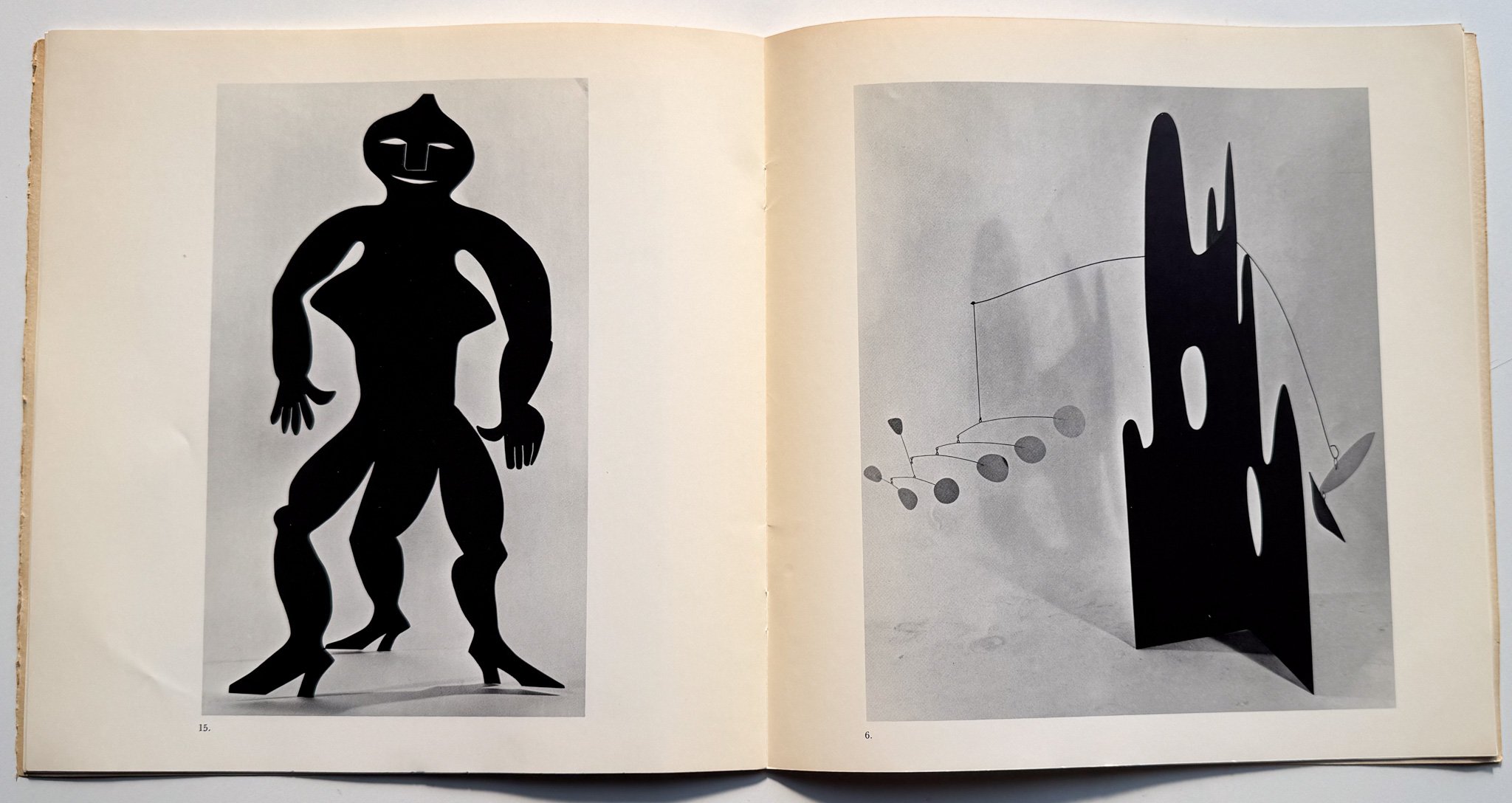



![[1st ed] Learning from Milan: Design and the Second Modernity (Inscribed)](https://images.squarespace-cdn.com/content/v1/61dc97a529892d0e352a9423/1702933907340-C3J0E5KOA987W8ICWJFT/IMG_1287.jpg)





